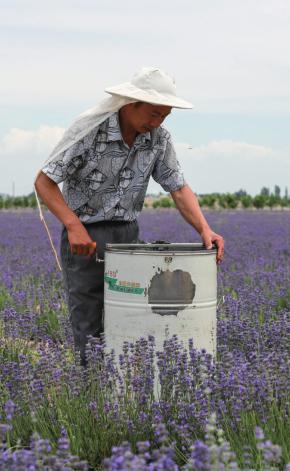University Bound
2018-07-26
High school graduates and their parents attend a college enrollment counseling event in Zibo, east Chinas Shandong Province, on June 25. Higher education institutions provided these services following the National College Entrance Exam in early June.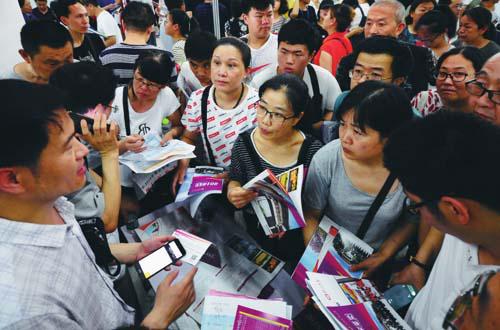
Drug Suspects Nabbed
A total of 660,600 criminal suspects were arrested in 536,704 drugrelated cases between January 2013 and April 2018, said Chinas top procuratorate on June 26.
The Supreme Peoples Procuratorate (SPP) also disclosed that local procuratorates prosecuted 741,260 suspects and 597,608 cases based on drug crimes during the same period.
“Chinas crackdown on drugs has seen positive results, notwithstanding that there are still a large number of drug cases and suspects,”said Huang Weiping, an offi cial with the SPP.
“The number of crimes related to new types of synthetic drugs—mainly crystal meth, yaba(a stimulant composed of methamphetamine and caffeine) and ketamine—has been rising rapidly in recent years, and suspects tend to commit crimes at a noticeably younger age,” Huang said.
Procuratorates in China have taken several measures, including launching anti-drug education in urban and rural communities, as well as providing information about antidrug work via news media.
In December 1987, the UN General Assembly adopted a resolution establishing June 26 as the International Day Against Drug Abuse and Illicit Traffi cking. Activities in China to mark the day this year were themed “healthy life, green and drug free.”
Battling Pollution
China has unveiled a guideline to comprehensively enhance ecological and environmental protection and win the battle against air, water and soil pollution.
The guideline, published on June 24 by the Central Committee of the Communist Party of China and the State Council, Chinas cabinet, specifi ed pollution prevention and control targets the country expects to achieve by 2020 and beyond.
The country will develop and implement a three-year plan to fi ght air pollution, with a focus on areas such as the Beijing-TianjinHebei region and its surrondings, and the Yangtze River Delta. Efforts will be made to improve the regionsindustry, energy, transport and land use structures.
By 2020, cities with low air quality standards should see their density of PM2.5, a key indicator of air pollution, fall at least 18 percent from 2015 levels. At the same time, prefecturelevel cities and above should see the nu mber of good-air days reach over 80 percent annually.
Emissions of sulfur dioxide and nitrogen oxides should drop at least 15 percent from 2015 levels, according to the plan, while chemical oxygen demand and emission of ammonia nitrogen should decrease over 10 percent.
The country will continue to implement an action plan on fi ghting water pollution as well as the system of river and lake chiefs.
China aims to have over 70 percent potable surface water by 2020, while the share of polluted surface water should be controlled within 5 percent. Meanwhile, approximately 70 percent of the countrys offshore area water should be of good quality.
To address soil pollution, the country will comprehensively implement specifi c measures to restore polluted soil, promote classifi ed disposal of waste and enhance the prevention and control of solid waste pollution.
By 2020, about 90 percent of polluted farmland should be utilized safely, while over 90 percent of other contaminated land should be used safely, according to the guideline.
Farm Produce Safety
On June 25, Chinas top legislature began an enforcement inspection of a law that protects the safety of farm produce.
It is the fi rst inspection since the Law on the Quality and Safety of Agricultural Products went into effect in 2006.
Separated into three groups, inspectors dispatched by the Standing Committee of the National Peoples Congress (NPC) will fan out to six provincial-level regions between July and August, while provincial legislatures in 11 regions will be asked to run parallel inspections within their own jurisdictions.
Key aspects to be checked include the input, production, packaging, labeling, transport, storing and management of production bases and quality control mechanisms.
A fi nal report will be submitted to the NPC Standing Committee in October.
Liver Transplants Up
According to a press conference by the National Health Commission on June 22, the fi ve-year survival rate of liver transplant recipients in China rose from around 59 percent in 2014 to 71 percent in 2017.
The one- and three-year survival rates in China reached 84 and 75 percent, respectively, on par with the international standard, said Guo Yanhong, an offi cial with the commission.
Guo said China performed 4,732 liver transplants in 2017, up over 26 percent year on year. Among them, 4,138 came from donations from cardiac deaths.
The current average waiting time for a liver transplant in China is 27.5 days, compared with 120 days in the United States, according to Guo.
Sports Tourism Boost
A total of 79.3 percent of Chinese respondents have taken part in sports tourism, indicating this new form of recreation is gaining popularity especially among the younger generation, a recent survey showed.
The survey, conducted by China Youth Daily, polled 2,004 people born between the 1960s and the 2000s, with 51 percent born in the 1980s.
The respondents said hiking(51.2 percent), mountain climbing (51 percent) and cycling (41.1 percent) are their favorite sports. They also mentioned rafting (20.7 percent), skiing (16.6 percent), rock climbing (16.2 percent) and ice skating (13.6 percent).
In December 2016, the countrys top tourism and sports administrations jointly issued guidelines to develop sports tourism, promising 100 sportsthemed tourist destinations and 100 quality events by 2020.
Data also showed that scuba diving is expanding in island tourism, while marathons are thriving across the country, attracting millions of runners to host cities. Some niche sports like parachuting, rock climbing and surfi ng are also gaining a following.
Crowdfunding for Pandas
A giant panda habitat in northwest Chinas Shaanxi Province has started online crowdfunding to raise money for bamboo planting to solve a food shortage for the endangered animal.
The program, I Plant Bamboos for Pandas, is accessible on Yiwuzhishu.cn, a website sponsored by the National Forestry and Grassland Administration for promoting vegetation.
Both individuals and companies can donate by scanning a QR code or transferring money to the offi cial bank account on the website to support the program, which will see to the planting of 133 hectares of bamboo in the Shaanxi Louguantai Forest Farm in the next seven years.
The items of expenditure are set to be put on a list for public supervision on the website.
According to the administration, the Qinling Research Base of Giant Panda Breeding in Shaanxi, one of the three giant panda breeding bases in China, has 23 pandas. Since each of them needs to eat 50 kg of bamboo per day, the base needs 400,000 kg of bamboo a year.
However, the local bamboo farm can only provide bamboo for two months of consumption. The base has to transport bamboo from elsewhere to fi ll the gap.
Pandas are picky with their food. They often waste food if it is not“tasty” or fresh enough. The bamboo farm plans to plant Bounsweet and Indo calamus, the animals two favorite bamboo species. The expanded bamboo forest will also allow for free-range grazing.
Paw Patrol
Children watch as a drug-sniffi ng dog is put to work in Guangzhou, capital of south Chinas Guangdong Province, on June 24. The Guangzhou Customs District and the Guangzhou No.2 Childrens Palace jointly held an open day activity to familiarize the children with the fi ght against drug traffi cking.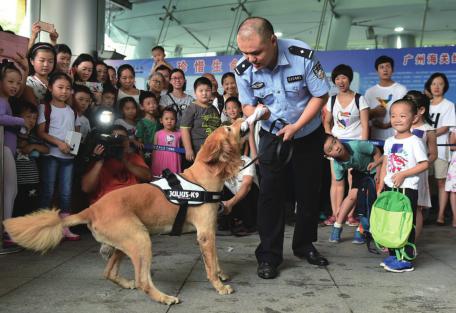
Flying Solo
An agricultural drone at the Shenzhen International UAV Expo 2018 in Shenzhen, south Chinas Guangdong Province, on June 22. The event displayed various types of unmanned aerial vehicles.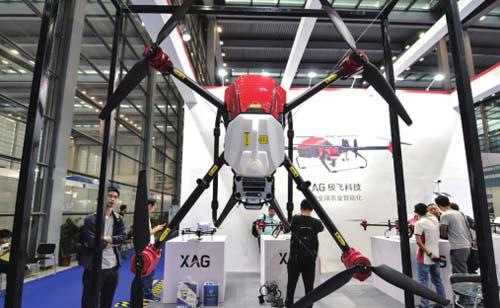
Lebanon Joins AIIB
The Asian Infrastructure Investment Banks (AIIB) Board of Governors has approved the membership application of th e Republic of Lebanon, bringing AIIBs total approved membership to 87, according to the banks offi cial website on June 26.
“Were pleased to welcome Lebanon as a prospective member,” said AIIB Vice President and Corporate Secretary Sir Danny Alexander. “It is an important and historic commercial hub in the Middle East and we look forward to Lebanon playing an active role within AIIB.”
Lebanon will offi cially join AIIB as a regional member once it completes the required domestic processes and deposits the fi rst capital installment with the bank. The shares allocated to the new prospective member come from AIIBs existing pool of unallocated shares.
At its launch in January 2016, there were 57 signatories to AIIBs Articles of Agreement. In 2017, AIIB announced the approval of another 27 prospective members. In May 2018, AIIB announced the approval of another two prospective members. AIIB expects to continue welcoming new members in the future.
The third annual meeting of AIIB kicked off in Mumbai on June 25, with the theme of Mobilizing Finance for Infrastructure: Innovation and Collaboration.
Tapping Into Rural Assets
Students draw sunfl owers at a plantation base in Nandu Village, Nangong City, north Chinas Hebei Province on June 26 . Over the past years, the city has promoted rural development by integrating agriculture and tourism to increase local farmers income.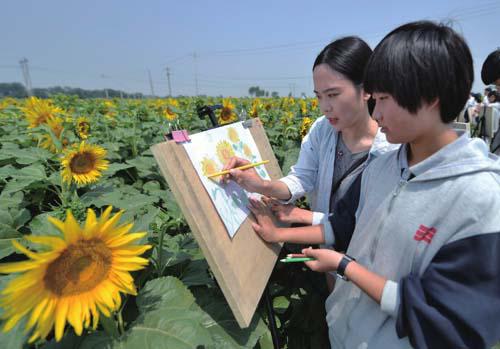
China Cuts RRR
China will lower some banks reserve requirement ratios (RRR) by 50 basis points on July 5, the countrys central bank announced on June 24.
The Peoples Bank of China(PBC) will cut the RRR for most banks to support qualifi ed debt-to-equity swap programs and help small businesses in fi nancing, according to an online statement.
According to a State Council executive meeting held on June 20, targeted cuts to banks RRR and other monetary policy tools will be used to boost credit supply to small and micro businesses.
Funds released by the cuts were amounted to 700 billion yuan ($108 billion), with 200 billion yuan ($31 billion) set for easing credit strain on small and micro businesses.
PBC will continue to create a sound environment for the countrys high-quality growth and supply-side structural reform, the bank said.
An earlier cut to the benchmark RRR came on April 25, when the rate was lowered by 1 percentage point to help small businesses and to improve overall stability and liquidity in the economy.
Tightening Regulation
Three Chinese cities have suspended commercial housing sales to entities registered as companies or institutions, in a further effort to halt speculative purchases.
The Hangzhou Housing Security and Management Bureau announced on June 26 that enterprises and institutions will no longer be qualifi ed to buy houses in areas with home-purchase restrictions.
The move by the capital city of east Chinas Zhejiang Province comes after similar policies were issued by Changsha on June 25 and Xian on June 24.
As the effects of housing controls wane over time, speculative demand increases and so local governments will strengthen their efforts to clamp down on speculation before a long-term mechanism is established, experts said.
Zhang Dawei, chief analyst with Centaline Property, told Economic Information Daily that buying commercial houses under the name of a company is a common way to bypass restrictions. Compared with the non-resale time span set for individual buyers, institutional buyers can resell houses through equity deals without having to worry about the time limit.
Meanwhile, the newspaper found that some newly established companies and associated enterprises have been participating in the lottery system for purchasing houses.
Zhang said the new restrictions aim to close the loophole in the lottery system, which, to some extent, will quell speculative demand. He also predicted that more cities using a lottery system will tighten policy on enterprise purchasing in the days to come.
Auto Investment
Chinas SAIC Motor announced on June 26 that German luxury carmaker Audi had acquired a 1-percent stake in SAIC Volkswagen which was previously held by Volkswagen AG.
SAIC Volkswagen is a joint venture established between Shanghaibased SAIC Motor and German automaker Volkswagen AG in 1984.
Following Audis acquisition, 50 percent of SAIC Volkswagens equity belongs to SAIC Motor, 38 percent to Volkswagen AG, 10 percent to Volkswagen China, and 1 percent each to Audi and Skoda.
According to SAIC Motor, the equity restructure in June means that Audi models can now be manufactured by the joint venture.
In November 2016, SAIC Motor signed a memorandum of understanding with Volkswagen AG in Germany, discussing the possibility of allowing SAIC Volkswagen to manufacture and sell Audi cars, as well as new energy vehicles.
Small Parts, Big Money
Workers assemble sewing machine parts at a factory in Changli County, north Chinas Hebei Province, on June 26. The county has formed an industry focusing on the research, production, sales and marketing of sewing machine parts, with 126 companies owning nearly 4,000 products.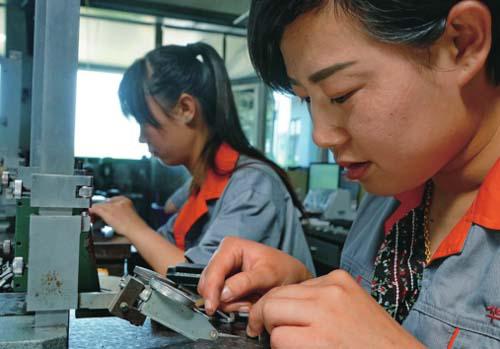
Brokerage Investment
Chinas real estate service platform operator 58.com will invest in domestic housing market broker 5i5j Holding Group, the company announced on June 22.
58.com will invest a total of 1.068 billion yuan ($164.2 million) in 5i5j, for 8.28 percent of the company. 5i5j will continue to operate independently.
Yao Jinbo, CEO of 58.com, said the two companies enjoy complementary advantages in the real estate service industrial chain and will work more closely to promote the development of a sustainable property brokerage sector.
“We hope to promote the development of an authentic housing listing mechanism as well as a housing listing information sharing platform,” Yao said.
58.com will also partner with other real estate market players to set up a fund to invest in promising brokers, hi-tech fi rms and other housing market service providers.
Smart Retail Boost
A wholly owned subsidiary of Suning.com plans to partner with property developer Evergrande Group on a joint venture to promote smart retail, Suning announced on June 22.
The Suning Plaza Commercial Property Management Company will invest 9.8 billion yuan ($1.5 billion) in the new fi rm, holding a 49-percent stake in the joint venture, while Evergrande Group will invest 10.2 billion yuan ($1.6 billion), according to a statement from Suning.
The joint venture will develop and run Sunings commercial centers combining online and offl ine retail services, the statement said.
In recent years, Suning has stepped up efforts to combine ecommerce with offl ine business to promote the development of smart retail.
It has partnered with property developers like Wanda and Country Garden this year to expand its offl ine retail presence. It aims to develop 300 Suning plazas by 2020.
During the mid-year online shopping spree, Suning saw its sales up 121 percent year on year during the period, with smart retail business sales growing 30 percent year on year.
Sweet Harvest
A beekeeper works in a lavender fi eld in the Ili Kazak Autonomous Prefecture of northwest Chinas Xinjiang Uygur Autonomous Region. The fl owers bloom in June and the honey produced by bees that feed on their nectar is popular locally.